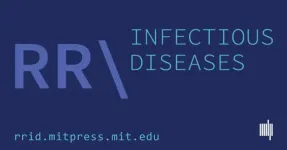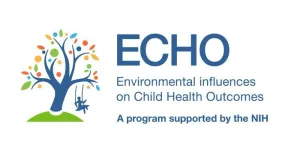(Press-News.org) The MIT Press and UC Berkeley School of Public Health proudly announce the launch of Rapid Reviews\Infectious Diseases (RR\ID). Building on the accomplishments of Rapid Reviews\COVID-19 (RR\C19), the Rapid Reviews editorial team is now setting their sights even higher.
“RR\C19 launched at a critical moment in global history and we are incredibly proud of the impact the journal has had so far,” said Stefano Bertozzi, editor-in-chief of RR\ID and Professor of Health Policy and Management at the UC Berkeley School of Public Health. “But when monkeypox started to spread in 2022, we saw an immediate need for authoritative peer review of emerging medical and public health topics. We built RR\C19 to be authoritative, fast, and flexible, and now RR\ID will adapt our open ‘curate, review, publish’ model for the advancement of infectious disease research throughout the world. We are grateful for the support from the MIT Press, Lynn Barr & Bob Campbell, and the Gates Foundation that has made this shift possible.”
With RR\ID, the editors will provide expert, professional peer review of research on a wider variety of infectious diseases and other pressing global threats. With new grant funding, they will also scale up their unique student training and mentoring model to support open science and democratize academic publishing through engagement with at least 12 academic institutions in low- and middle-income countries (LMIC).
The mission of Rapid Reviews remains the same – to prevent the dissemination of false or misleading scientific information and to accelerate the validation and diffusion of robust, impactful scientific findings through rapid peer review. To accomplish this, the editorial team of RR\ID will continue to engage with global academic communities and leverage AI to ensure a level of rigor that clinicians, researchers, journalists, policy makers, and others worldwide can rely on to make sound judgments about current crises and their amelioration.
But in order to more fully democratize public access to reliable research studies from the global scientific community, the team also plans to improve how young researchers and scientists from LMIC are included in the “closed-door” ecosystem of traditional scientific publishing.
“In the past, academic publishing has been too expensive, too exclusive, and somewhat unbalanced, especially for our colleagues in LMICs, where inclusion has not always been equitable,” explains Hildy Fong Baker, managing director of RR\ID. “By introducing the next generation of researchers in LMICs to our editorial process of selecting preprints and identifying peer reviewers, we will not only welcome them to embrace open publishing initiatives and train them to conduct quality peer review, but also create a deep understanding of scientific publishing and communications.”
Launched in the early days of the pandemic, RR\C19 was the first open-access overlay journal to conduct rapid formal peer reviews of COVID-19-related research preprints. It has now completed more than 600 reviews and is currently the second largest overlay journal in existence. Recognized with the 2022 Association of American Publishers’ PROSE Award for Innovation in Journal Publishing, its efforts have been highlighted in mainstream media outlets, such as the New York Times (for its contributions in debunking the Yan Paper in 2020), the Washington Post, and the Hill.
###
About the MIT Press
Established in 1962, the MIT Press is one of the largest and most distinguished university presses in the world and a leading publisher of books and journals at the intersection of science, technology, art, social science, and design. MIT Press publications are known for their intellectual daring, scholarly standards, interdisciplinary focus, and distinctive design.
About the UC Berkeley School of Public Health
For 75 years and counting, the UC Berkeley SPH has been dedicated to making a transformative impact on the health of populations through its values of health as a right, strength through diversity, think forward, and impact first. To eliminate inequity and injustice that affects the health and dignity of all people, SPH is committed to radical public health collaborations that challenge conventional thinking, leverage technology, and build bridges between research, public policy, education, and action.
END
New MIT Press journal Rapid Reviews\Infectious Diseases will extend fight against disinformation to more infectious diseases and emerging pandemics
With the launch of Rapid Reviews\Infectious Diseases, the editorial team behind Rapid Reviews\COVID-19 applies their successful preprint review model to new research on infectious diseases like monkeypox, dengue fever, or herpes, in addition to COVID-19.
2023-08-28
ELSE PRESS RELEASES FROM THIS DATE:
Brain signals transformed into speech through implants and AI
2023-08-28
Researchers from Radboud University and the UMC Utrecht have succeeded in transforming brain signals into audible speech. By decoding signals from the brain through a combination of implants and AI, they were able to predict the words people wanted to say with an accuracy of 92 to 100%. Their findings are published in the Journal of Neural Engineering this month.
The research indicates a promising development in the field of Brain-Computer Interfaces, according to lead author Julia Berezutskaya, researcher ...
How plants pass down genetic memories
2023-08-28
When organisms pass their genes on to future generations, they include more than the code spelled out in DNA. Some also pass along chemical markers that instruct cells how to use that code. The passage of these markers to future generations is known as epigenetic inheritance. It’s particularly common in plants. So, significant findings here may have implications for agriculture, food supplies, and the environment.
Cold Spring Harbor Laboratory (CSHL) Professors and HHMI Investigators Rob Martienssen and Leemor Joshua-Tor have been researching how plants pass along the markers that ...
BU CTE Center publishes largest CTE case series ever in youth, high school and college athletes who died young
2023-08-28
EMBARGOED by JAMA Neurology until 11 a.m. EDT Aug. 28, 2023
Contact: Maria Ober, 617-224-8963, mpober@bu.edu
(Boston)— A new BU Chronic Traumatic Encephalopathy (CTE) Center study has found that, among a sample of 152 young athletes exposed to repetitive head impacts (RHI) who were under age 30 at the time of death, 41.4% (63) had neuropathological evidence of CTE, a degenerative brain disease caused by RHI. The study published in JAMA Neurology includes the first American woman athlete diagnosed with CTE, a 28-year-old collegiate soccer player whose identity remains private.
“This study clearly shows that the pathology of CTE starts early,” said corresponding ...
NIH study shows association between better neighborhood conditions and lower childhood asthma rates
2023-08-28
Living in a neighborhood with better access to resources such as high-quality housing, healthy food, parks and playgrounds, and clean air during the early stages of childhood was associated with lower asthma incidence in a new study from NIH’s Environmental influences on Child Health Outcomes (ECHO) Program.
Children born in high-opportunity neighborhoods had an asthma incidence rate of 23.3 cases per 1,000 children, while those born in very low and low-opportunity neighborhoods had rates of 35.3 per 1,000 ...
Scientists use quantum device to slow down simulated chemical reaction 100 billion times
2023-08-28
Scientists at the University of Sydney have, for the first time, used a quantum computer to engineer and directly observe a process critical in chemical reactions by slowing it down by a factor of 100 billion times.
Joint lead researcher and PhD student, Vanessa Olaya Agudelo, said: “It is by understanding these basic processes inside and between molecules that we can open up a new world of possibilities in materials science, drug design, or solar energy harvesting.
“It could also help improve ...
Assessment of hospital-onset SARS-CoV-2 infection rates and testing practices
2023-08-28
About The Study: In this study of hospitals reporting SARS-CoV-2 infections, there was an increase of hospital-onset SARS-CoV-2 infections when community-onset infections were higher, indicating a need for ongoing and enhanced surveillance and prevention efforts to reduce in-hospital transmission of SARS-CoV-2 infections, particularly when community-incidence of SARS-CoV-2 infections is high.
Authors: Kelly M. Hatfield, M.S.P.H., of the Centers for Disease Control and Prevention in Atlanta, is the ...
Trends in suicide rates among post-9/11 veterans with and without traumatic brain injury
2023-08-28
About The Study: In a large cohort of U.S. military veterans serving after 9/11, suicide rates increased more than 10-fold from 2006-2020, a significantly greater rate of change than in the U.S. adult population. Over the 15-year period, veterans with traumatic brain injury (TBI) had suicide rates 56% higher than veterans without TBI and three times higher than the U.S. adult population.
Authors: Jeffrey T. Howard, Ph.D., of the University of Texas at San Antonio, is the corresponding author.
To access the embargoed study: Visit our For The Media website at this link https://media.jamanetwork.com/
(doi:10.1001/jamaneurol.2023.2893)
Editor’s ...
Estimated lifetime gained with cancer screening tests
2023-08-28
About The Study: The findings of this systematic review and meta-analysis of 18 long-term randomized clinical trials involving 2.1 million individuals suggest that current evidence does not substantiate the claim that common cancer screening tests save lives by extending lifetime, except possibly for colorectal cancer screening with sigmoidoscopy.
Authors: Michael Bretthauer, M.D., Ph.D., of the University of Oslo in Oslo, Norway, is the corresponding author.
To access the embargoed study: Visit our For The Media website at this link https://media.jamanetwork.com/
(doi:10.1001/jamainternmed.2023.3798)
Editor’s ...
Neuropathologic and clinical findings in young contact sport athletes exposed to repetitive head impacts
2023-08-28
About The Study: This case series found that young brain donors exposed to repetitive head impacts were highly symptomatic regardless of chronic traumatic encephalopathy (CTE) status, and the causes of symptoms in this sample are likely multifactorial. Future studies that include young brain donors unexposed to repetitive head impacts are needed to clarify the association among exposure, white matter and microvascular pathologic findings, CTE, and clinical symptoms.
Authors: Ann C. McKee, M.D., of the U.S. Department of Veteran Affairs in Boston, is the corresponding author.
To access the embargoed study: Visit our For The Media website ...
Due to sea-ice retreat, zooplankton could remain in the deep longer
2023-08-28
Due to intensifying sea-ice melting in the Arctic, sunlight is now penetrating deeper and deeper into the ocean. Since marine zooplankton respond to the available light, this is also changing their behaviour – especially how the tiny organisms rise and fall within the water column. As an international team of researchers led by the Alfred Wegener Institute has now shown, in the future this could lead to more frequent food shortages for the zooplankton, and to negative effects for larger species including seals and whales. The study ...
LAST 30 PRESS RELEASES:
A shift from the sandlot to the travel team for youth sports
Hair-width LEDs could replace lasers
The hidden infections that refuse to go away: how household practices can stop deadly diseases
Ochsner MD Anderson uses groundbreaking TIL therapy to treat advanced melanoma in adults
A heatshield for ‘never-wet’ surfaces: Rice engineering team repels even near-boiling water with low-cost, scalable coating
Skills from being a birder may change—and benefit—your brain
Waterloo researchers turning plastic waste into vinegar
Measuring the expansion of the universe with cosmic fireworks
How horses whinny: Whistling while singing
US newborn hepatitis B virus vaccination rates
When influencers raise a glass, young viewers want to join them
Exposure to alcohol-related social media content and desire to drink among young adults
Access to dialysis facilities in socioeconomically advantaged and disadvantaged communities
Dietary patterns and indicators of cognitive function
New study shows dry powder inhalers can improve patient outcomes and lower environmental impact
Plant hormone therapy could improve global food security
A new Johns Hopkins Medicine study finds sex and menopause-based differences in presentation of early Lyme disease
Students run ‘bee hotels’ across Canada - DNA reveals who’s checking in
SwRI grows capacity to support manufacture of antidotes to combat nerve agent, pesticide exposure in the U.S.
University of Miami business technology department ranked No. 1 in the nation for research productivity
Researchers build ultra-efficient optical sensors shrinking light to a chip
Why laws named after tragedies win public support
Missing geomagnetic reversals in the geomagnetic reversal history
EPA criminal sanctions align with a county’s wealth, not pollution
“Instead of humans, robots”: fully automated catalyst testing technology developed
Lehigh and Rice universities partner with global industry leaders to revolutionize catastrophe modeling
Engineers sharpen gene-editing tools to target cystic fibrosis
Pets can help older adults’ health & well-being, but may strain budgets too
First evidence of WHO ‘critical priority’ fungal pathogen becoming more deadly when co-infected with tuberculosis
World-first safety guide for public use of AI health chatbots
[Press-News.org] New MIT Press journal Rapid Reviews\Infectious Diseases will extend fight against disinformation to more infectious diseases and emerging pandemicsWith the launch of Rapid Reviews\Infectious Diseases, the editorial team behind Rapid Reviews\COVID-19 applies their successful preprint review model to new research on infectious diseases like monkeypox, dengue fever, or herpes, in addition to COVID-19.





